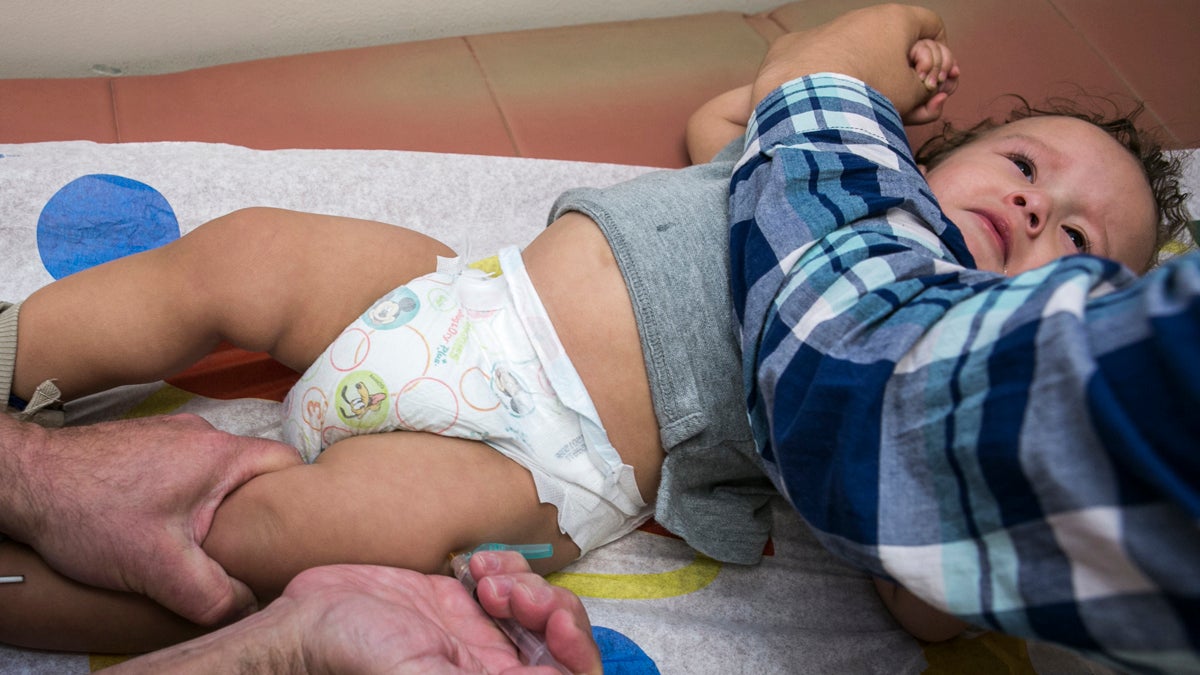What’s behind parents’ perspectives on vaccination?
Listen
(AP Photo/Damian Dovarganes)
Vaccines are a huge health topic right now, especially with the recent measles outbreak that originated in California’s Disneyland.
Alison Buttenheim, an assistant professor in the school of nursing at the University of Pennsylvania, joined us this week to talk about what research suggests about whether or not this outbreak is likely to change parent perspectives on vaccines.
Below is a transcription of her conversation with Pulse Host Maiken Scott.
What have you learned about parental thoughts and perceptions of vaccines and vaccine safety?
We hear a lot in the media right now with the outbreak that it’s this autism fear that parents have, particularly with the MMR vaccine, but our research suggests there’s a really broad range of fears that parents can articulate. Sometimes they say it’s just so many shots that you’re putting into my tiny, little baby and I’d rather just wait or space them out. We also hear concerns that are particularly worrisome that ‘we don’t need these shots.’ ‘These diseases aren’t very common.’ ‘They’re not very dangerous’ or ‘My kid has such a healthy diet or such a healthy lifestyle that they’ll be protected naturally.’ So besides the autism fear, there are lots of other concerns parents have.
Is there any kind of correlation with the education level of the parents, perhaps even income… I’m thinking about access to healthcare?
Sure. The access and the socioeconomic status I think are separate issues. So let me start with access. We have an amazing public-private partnership in the U.S., Vaccines for Children, and basically if you want to get your kid vaccinated, even if you’re uninsured or underinsured, VFC will pay for those vaccines. So while we do see slightly lower rates of vaccine coverage for lower income kids, that’s not the bulk of the gap. In terms of hesitancy or outright refusal, that very much is associated with higher income parents, wealthier parents, and they tend to sort of cluster both in space and socially. So that’s where we worry epidemiologically that the parents who aren’t vaccinating live together, are in school together and are in communities together.
Let’s talk a little bit about the numbers. What do we know about how many kids in the U.S. are not vaccinated?
We extrapolated from some data from the CDC; they run the national immunization survey and they have a figure for sort of the toddler age range of how many kids have no vaccines at all and if we expand that to all kids under age 10, we think there are about 280,000 kids who have received no vaccines at all. Other data that the CDC collects on how many kids have an exemption at the moment when they enter kindergarten from whatever vaccines the state mandates for that school entry time and that’s been around two percent but if you expand that to look at kindergarten to maybe fourth grade, we think there are 400,000 kids in the U.S. who have an exemption from one or more state-mandated vaccines. That doesn’t mean they haven’t received that vaccine, necessarily, but their parent has applied for an exemption.
So that’s a very small number, right? So speaking of people’s fears about things. Are perhaps the fears that this will really cause some kind of outbreak overblown?
If herd immunity or community immunity from measles were intact, we would not have seen 600 cases last year in the U.S. and we wouldn’t see 100 cases or more from this Disneyland outbreak. It doesn’t sound like a lot to say 280,000 or 400,000 kids across the U.S. might be missing some of these shots but we have to remember measles is very highly infectious and there’s just more of a chance in these clustered communities that a sick kid will bump into a kid who hasn’t been vaccinated and is susceptible to the disease.
Some people say this outbreak might have one positive effect and that is that perhaps it will show people that vaccines are important. What do you think? Will this have a lasting impact?
I would like to say yes, but if I had to make a prediction, I’d say no at this point. I’ve looked at past outbreaks. There was a big outbreak in 2008 in San Diego, Ca. that didn’t seem to have any effect long-term on people’s decisions to vaccinate or not. We also have short attention spans and a very short news cycle and I think once this outbreak is wrapped up and moved on, we probably won’t see a lasting impact.
What do you think are some effective ways to talk to parents about vaccines, about vaccine safety and to discuss some of the fears?
This is something that pediatricians and other primary care providers who see these parents really want to know about and at this point there’s not a really good evidence base for what exactly are the set of messages that will be persuasive to parents. I think we have a lot of effective messages and we don’t have good data about how to match those to specific fears or concerns that parents have. In the past week, we’ve heard a lot of backlash against the non-vaccinating, anti-vaccine parents and I think that sort of shaming and blaming approach is certainly not going to work. That’s going to make parents more defensive, less likely to listen to their healthcare provider, less likely to look at good, solid scientific evidence so I know that’s definitely not the approach that’s going to work.
WHYY is your source for fact-based, in-depth journalism and information. As a nonprofit organization, we rely on financial support from readers like you. Please give today.



